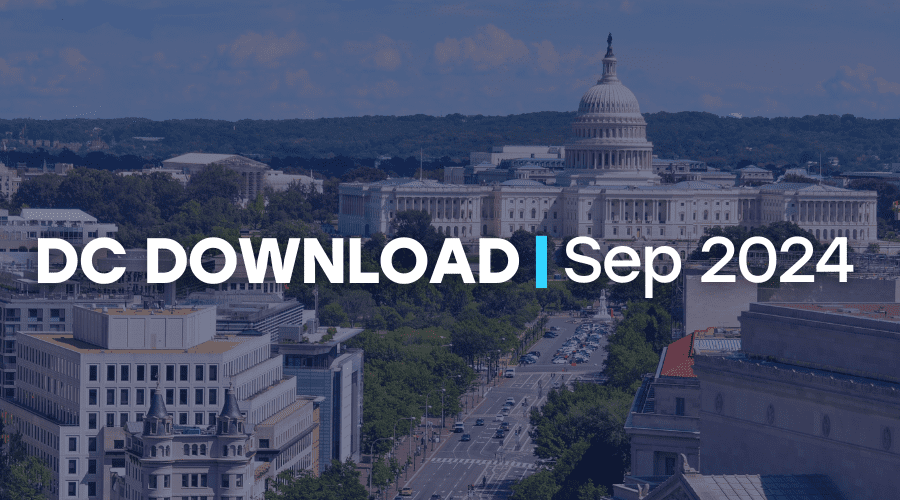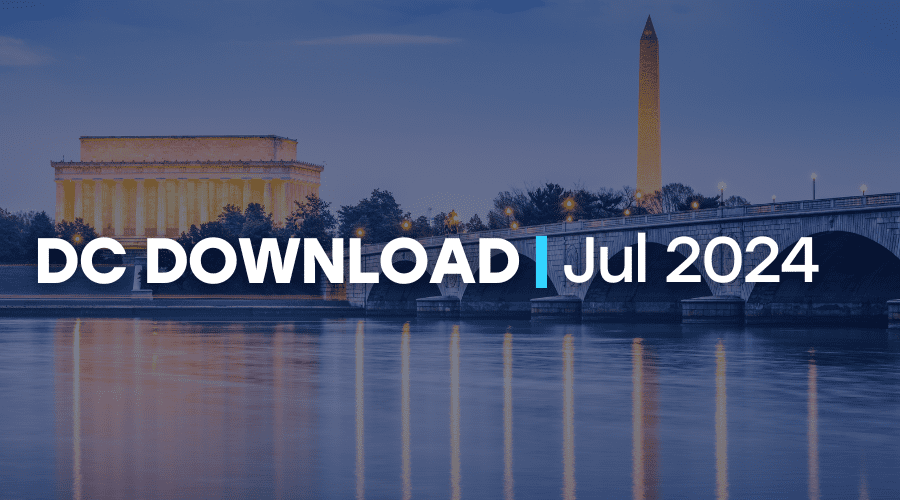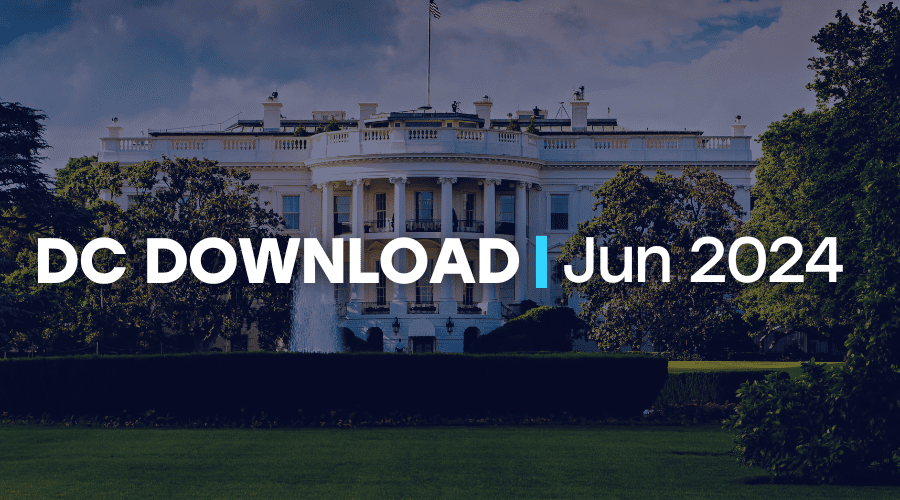As we move from the excitement of the Olympics through the annual August congressional recess and into the bustling return to school and Congress’s return to Washington, September is a time of renewed focus. While students settle into their routines and lawmakers get back to work, the energy and unity sparked by the Olympics remind us of what we can achieve when we come together. Now, with Congress back in session, there is an important opportunity to turn that collective spirit into policies that strengthen the charitable sector.
Appropriations Update
As the deadline approaches, Congress is racing against the clock to finalize the FY25 spending bills or pass a continuing resolution (CR) to avoid a government shutdown. The September 30th deadline to pass a spending bill is looming around the corner. On September 18, Speaker Mike Johnson (R-LA) held a vote on a six-month CR that included a controversial rider, supported by former President Donald Trump, requiring proof of citizenship for voter registration in federal elections.
Senate leaders swiftly dismissed this provision, labeling it a “non-starter” and accusing House leadership of politicizing their responsibility to pass a CR before the deadline. The Johnson CR, with its contentious voter registration language, failed the House by a vote of 202-220.
As the country nears a critical election year, neither party is eager to face the political fallout of a government shutdown. It is anticipated that House and Senate leaders will reach an agreement to prevent this outcome. However, the situation remains fluid, with developments changing rapidly.
Fearless Foundation Court Case
On September 11, the Fearless Foundation settled a lawsuit claiming that their grant program for Black women entrepreneurs is racially discriminatory. In June, the U.S. Court for the 11th Circuit ruled that the Fearless Foundation grant program must remain halted under a preliminary injunction while the case moved forward in court. Under the agreement reached by the parties, the Fearless Foundation agreed to permanently close its Fearless Strivers grant contest, which awarded $20,000 grants to Black woman-owned businesses. “This settlement underscores the continued need to defend our First Amendment right to exercise our values through philanthropy, including giving that supports historically marginalized groups. While the settlement may have a limited legal impact, we remain concerned about forces in our society making it harder for nonprofits and philanthropy to live out our values and serve our communities,” said Independent Sector President and CEO Dr. Akilah Watkins in a joint statement with the Council on Foundations. “We will continue to stand against efforts to restrict or chill the charitable sector’s vital work toward a more just, equitable society.” The Council and Independent Sector recommend that foundations continue to work with legal counsel to ensure compliance, including ensuring that grants are considered gifts and do not create contractual relationships with grantees. For more information on how this settlement impacts philanthropy and foundation grantmaking, please review the Council on Foundations’ guide.
IRS Updates Guidance on Employer Retirement Plan Contributions Tied to Employee Student Loans
Last month, The Internal Revenue Service (IRS) issued interim guidance for employer sponsored retirement plans that permits employers with a 401(k) plan, 403(b) plan, governmental 457(b) plan or SIMPLE IRA plans to provide matching contributions based on student loan payments, rather than based solely on contributions the employee is making to their retirement plans. This change — directed by the SECURE 2.0 Act of 2022 — allows employees who are forced to choose between contributing to an employer sponsored retirement plan and forgoing the retirement plan contribution to not miss out on their matching contributions while making eligible student loan payments. For more details about this rule, including what constitutes a qualifying payment, please refer to IRS Notice 2024-63.
Charitable Sector Workers in the Public Service Loan Forgiveness Program Impacted by 8th Circuit Ruling
Last month, the 8th Circuit Court of Appeals issued a sweeping injunction against the Saving on a Valuable Education (SAVE) student loan repayment plan. The SAVE plan was established by the Biden-Harris Administration in July 2023, lowers monthly undergraduate loan payments to 5% of a borrower’s’ discretionary income above 225% of the federal poverty line — up from 150% — and provides for shorter repayment periods and earlier loan forgiveness for borrowers with smaller starting balances. Several legal challenges have been filed since the plan rolled out, one of which led to the injunction by the 8th Circuit. The Biden-Harris Administration appealed the ruling to the U.S. Supreme Court, which on August 28, declined to lift the injunction while the appeals process plays out. The case working its way through the judicial system is not challenging the legality of the Public Service Loan Forgiveness Program (PSLF), which forgives any unpaid loan balance after 120 payments are made while the borrower works for a qualifying employer, which among others includes 501(c)(3) nonprofits. However, many borrowers working towards PSLF are enrolled in the SAVE program and have had their loans placed in a general forbearance while this case plays out; time in this forbearance will not be counted towards their 120 PSLF qualifying payments. This forbearance is scheduled to remain in place until October 31, 2024, though it could be extended if the courts have not yet rendered a final decision before that date. IS will continue to monitor this case as it moves through the courts and provide updates in future editions of the DC Download.
Generosity Commission Report
On September 17, the 2024 Generosity Commission report was released, which the commission describes as, “a rigorous analysis of generosity today.” Notably, the 2024 report recommends increasing the availability of the charitable contribution tax deduction and urges Congress to adopt legislation that increases the number of taxpayers who can receive tax benefits from charitable contributions and that increases the total amount that can be donated. The report goes on to name several different avenues to accomplish this recommendation. Independent Sector is a strong supporter of the Charitable Act (S. 566/H.R. 3435), led by Senators James Lankford (R-OK), Chris Coons (D-DE), Catherine Cortez Masto (D-NV), Marco Rubio (R-FL), Maggie Hassan (D-NH), Raphael Warnock (R-GA), Susan Collins (R-ME), Amy Klobuchar (D-MN), Gary Peters (D-MI), Tim Scott (R-SC), and Jeanne Shaheen (D-NH) in the Senate and Representatives Blake Moore (R-UT), Danny K. Davis (D-IL), Michelle Steel (R-CA), and Chris Pappas (R-NH) in the House. The bill would accomplish this recommendation by expanding the expired charitable deduction for those who do not itemize on their tax returns and ensure that every person who donates to charities, houses of worship, religious organizations, and other charitable organizations of their choice are able to deduct that donation from their federal taxes.
When this column went to publication, the Charitable Act had 24 cosponsors in the Senate and 65 cosponsors in the House. IS urges you to contact your Senators and Representative(s) to urge them to consider signing on as a cosponsor to the Charitable Act, or thank them if they are already a cosponsor.



